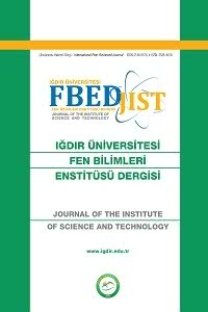İşletmelerde Hayvan Refahının Ekonomik Yönlerinin Değerlendirilmesi
Hayvan refahı, Tarım, İşletme ekonomisi
Assessment of Economic Aspects of Animal Welfare in Farm
Animal welfare, Agriculture, Farm economics,
___
- Animal Agriculture Alliance (A.A.A.). (2004). Consumers Attitudes About Animal Welfare: 2004 National Public Opinion Survey.
- Bartussek, H. (2001). An historical account for the development of the Animal Needs Index ANI-35L as part of the attempt to promote and regulate farm animal welfare in Austria: An example of the interaction between animal welfare science and society. Acta Agriculturae Scandinavica, Section A – Animal Science, 30: 34–41.
- Bennett, R.M., Christiansen, K., Clifton-Hadley, R.S. (1999). Estimating the costs associated with endemic diseases of dairy cattle. Journal of Dairy Research, 66, 455-459.
- Bennett, R. M. (1996). People's Willingness to Pay for Farm Animal Welfare. Animal Welfare, 5 (1), 3-11.
- Duncan, I.J.H. (2005). Science-based assessment of animal welfare: farm animals. Rev Sci Tech, 24 (2), 483-492.
- EFSA, (2012a). Scientific opinion on the welfare of cattle kept for beef production and the welfare in intensive calf farming systems, EFSA J, 10 (5): 2669.
- EFSA, (2012b). Statement on the use of animal-based measures to assess the welfare of animals, EFSA J, 10, 2767. DOI: 10.2903/j.efsa.2012.2767.
- Enting, H., Kooij, D., Dijkhuizen, A.A., Huirne, R.B.M., Noordhuizen Stassen, E.N. (1997). Economic losses due to clinical lameness in dairy cattle. Livestock Production Science, 49, 259-267.
- Esslemont, R.J. (1990). The cost of lameness in dairy herds. Update in cattle lameness. Proc. 6th Int. Symp. On Diseases of the Ruminant Digit, Liverpool, 237-251.
- Grandin, T. (2000). Management and economic factors of handling and transport. In: Grandin, T.(ed.) Livestock Handling and Transport, 2nd edn. CAB International, Wallingford, UK,pp. 1–14.
- Honkavaara, M. (1989). Effect of porcine stress on the development of PSE meat, its characteristics and influence on the economics of meat products manufacture. Dissertation University of Turku, Finland.
- Kossaibati, M.A., Esslemont, R.J. (1997). The costs of production diseases in dairy herds in England. Veterinary Journal, 154, 41-51.
- Lama, G.C.M., Estevez-Moreno, L.X., Sepulveda, W.S., Estradachavero, M.C., Rayas-Amor, A.A., Villarroel, M. And Maria, G.A. (2017). Mexican Consumers' Perceptions and Attitudes Towards Farm Animal Welfare and Willingness to Pay for Welfare Friendly Meat Products, Meat Science, 125:106–113.
- Makdisi, F., Marggraf, R. (2011). Consumer Willingness to Pay for Farm Animal Welfare in Germany- The Case of Broiler, Department of Agricultural Economics and Rural Development, University of Göttingen, Platz der Göttinger Sieben, Göttingen, Germany.
- McInerney J.P. (2004). Animal welfare, economics and policy. Report to Defra.Retrieved from:http://archive.defra.gov.uk/evidence/economics/foodfarm/reports/documents/animalwelfare.pdf
- Mialon, M. M., Lherm, M., Micol, D., Doreau, M., Martin, C. (2013). Improving animal welfare and economic sustainability in bull fattening systems in France: A comparison of three different feeding programmes. In Harinder P. S. Makkar (Ed.), Enhancing animal welfare and farmer income through strategic animal feeding — Some case studies. FAO Animal Production and Health Paper No. 175. Rome, Italy.
- OIE, (2008). Terrestrial Animal Health Code, Article 7.1.1, Introduction to the recommendations for animal welfare, World Orginazition for Animal Health (OIE), Paris, France. http://web.oie.int/eng/normes/mcode/en_chapitre_1.7.1.pdf. (Erişim tarihi: 03.02.2022).
- Savaş, T., Yurtman, İ. Y., Tölü, C. (2009). Hayvan Hakları ve Hayvan Refahı: Felsefi Bakış - Nesnel Arayışlar. Hayvansal Üretim, 50(1):54-61.
- Seo, T., Date, K., Daıgo, T., Kashıwamura, F. Sato, S. (2007). Welfare Assessment on Japanese Dairy Farms Using the Animal Needs Index, Universities Federation for Animal Welfare, 16: 221-223, UK.
- Spooner, J.M., Schuppli, C.A. And Fraser, D. (2014). Attitudes of Canadian Citizens toward Farm Animal Welfare: A Qualitative Study, Livestock Science, 163:150–158.
- Tarım ve Orman Bakanlığı, 2017. https://www.tarimorman.gov.tr/SGB/Belgeler/2013-2017/GTHB%202018-2022%20STRATEJI%CC%87K%20PLAN.PDF (Erişim tarihi: 18.04.2023)
- Turan, Ö. (2018). Büyükbaş ve Kanatlı Hayvan Yetiştiriciliğinde Olası Hayvan Refahı Uygulamalarına Yönelik Tüketici Tercihlerinin Belirlenmesi Üzerine Bir Araştırma, Bursa Uludağ Üniversitesi Fen Bilimleri Enstitüsü, Doktora Tezi.
- Ünal, N. (2011). Avrupa Birliği ve Türkiye’de yetiştiricilikte hayvan refahıyla ilgili yasal düzenlemeler. Anadolu Üniversitesi Yayını, No:2332, Web-Ofset Tesisleri, Eskişehir, s. 159.
- WQ, 2009. Welfare Quality Assessment Protocols (for Cattle, Calf, Poultry and Pig). Welfare Quality Consortium: Lelystad, the Netherlands.
- ISSN: 2146-0574
- Yayın Aralığı: 4
- Başlangıç: 2011
- Yayıncı: -
Anadolu Mandalarında Vücut Kondisyonu Değerlendirme Standardının Oluşturulması
Onur ŞAHİN, Önder Bayram ÇOBAN, Mehmet İhsan SOYSAL
Türkiye Florası İçin Yeni Bir İstilacı Bitki Kaydı: Grindelia hirsutula Hook. & Arn.
Abdurrahman SEFALI, Kübra UZUN
Halil İbrahim GÖKDERE, Ali Baran YILMAZ, Mehmet TEKİN, Mehmet Zahit YEKEN, Vahdettin ÇİFTÇİ
Murat ÜNVERDİ, Hasan KÜÇÜK, Mehmet Senan YILMAZ
Sevim Feyza ERDOĞMUŞ, Şerife Nur DURMUŞ, Saniye ÖZDEMİR
Burcu ERGÖZ, Ahmet Regaib OĞUZ
Mehmet Zahit UZUN, Erdal BAŞARAN, Yuksel CELIK
İbrahim ÖZKOÇ, Mustafa BİLGİ, Cem Tolga GÜRKANLI, Luau MUSTAFA
